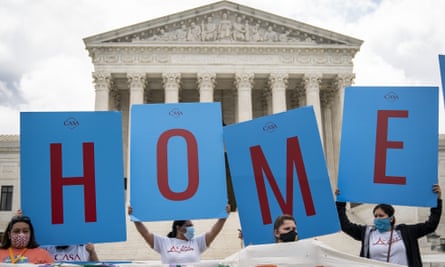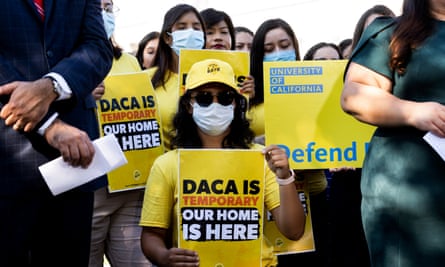The Texas federal judge Andrew Hanen found the revised Deferred Action for Childhood Arrivals Program (Daca) policy, which shields thousands of immigrants brought to the US as children, illegal last week – after a five-year legal battle about the program’s existence that has left many Daca recipients in limbo about their future in America.
For one educator and activist, Alondra Garcia, the ruling is another blow in the long fight for a permanent solution for many like her to be seen in the country they have called home for years.
“My reaction [to the ruling] is one I have felt since the first attacks on Daca,” Garcia, a Daca and U-visa recipient who has lived in the US for more than two decades, said. “Fear, uncertainty, sadness, anger – a mix of emotions.”
Since she was three, Garcia has only known America – Milwaukee, Wisconsin, specifically.
In October 1999, along with her mother and younger sister, she arrived from Morelia, Mexico, on a temporary visiting visa and never returned, putting them in an illegal status. Thirteen years later, on 15 June 2012, executive actions by the then president, Barack Obama, provided deportation relief for undocumented immigrants who came illegally to America as children through Daca. Garcia applied for and received the status two years later, in 2014.

That law has since granted relief to more than 600,000 undocumented young adults. It has allowed them to live fuller, richer lives where they can rent or buy homes, work and attend school. Some have become more active in their communities, more productive at work, and better educated, while others have tried to enlist in the nation’s military.
“We belong here and need more recognition,” Garcia said, adding that though the status had made it possible for many like her to “belong”, there was more work to be done because the Daca bill remains embattled with political maneuvering.
Hanen wrote in his ruling: “While sympathetic to the predicament of Daca recipients and their families, this court has expressed its concerns about the legality of the program for some time … The executive branch cannot usurp the power bestowed on Congress by the constitution – even to fill a void.”
In response, the Biden administration said in a statement that it was “deeply disappointed”.
“Hundreds of thousands of Daca recipients have been able to live and work lawfully in our country without fear of deportation,” the statement said. “We have long maintained, we disagree with the district court’s conclusion that Daca is unlawful, and will continue to defend this critical policy from legal challenges.”
Hanen’s decision allows for existing Dreamers, as Daca recipients are interchangeably called, to keep and renew their status. However, no new applications are permitted.
“Dreamers continue facing legal battles because of politicians who don’t see the contributions we make in society,” Garcia said. “They view us as second class. They continue to use Dreamers as a scapegoat to defer attention from the real issue; that the immigration system is broken. Politicians, specifically Republicans, do not want to invest time and money on comprehensive immigration reform because that would mean their chance of staying in office would be jeopardized.”
Kica Matos, the president of the National Immigration Law Center, agreed that though the policy had been transformative, Daca recipients and immigrant youth were still treated as a “political football … forcing them to endure excruciating uncertainty”.
While acknowledging that the case “will almost certainly be appealed to the fifth circuit and potentially to the US supreme court,” Matos called for an end to the government’s reluctance to recognize Dreamers and a bipartisan permanent legislative solution.
Congress has the power to provide such remedies to recipients, but “its repeated failure to do so comes down to political will”, she said. “In poll after poll, Americans across the political spectrum overwhelmingly support a pathway to citizenship for immigrant youth. And yet, a loud minority has repeatedly derailed good-faith efforts to get it done so they can keep leverage and advance an extremist agenda. That comes at great cost to all of us.”
That cost can be seen in America’s economy.
For example, in Garcia’s home state of Wisconsin – residence for more than 70,000 undocumented people, of which 8,000 are Daca recipients – Dreamers play a vital role in the state’s economy. Like any other citizen they pay taxes – $48m in local, state and federal deductions. Their contribution is so considerable that the state would lose $427m in GDP annually without them.
One of the first things Garcia did in 2014 when she was granted Daca status, was get her work permit. She said it made her feel like her “American friends” and “allowed me to work and start saving up for college”.
Mo Kantner, American Immigration Council’s senior director of policy and research, told the Guardian: “Daca recipients have been contributing to the US economy for years, filling workforce shortages and starting businesses.
“In 2019 alone, the Daca-eligible population earned $26.4bn and paid $5.8bn in federal, state and local taxes,” she said. “There are over 46,000 Daca-eligible entrepreneurs innovating our industries and creating even more local jobs. A solution for Dreamers will strengthen both our community and our economy.”
after newsletter promotion
The president and CEO of the National Immigration Forum, Jennie Murray, added that Dreamers were “deeply rooted members of our communities – at our churches, our workplaces and our schools.
“Nearly 1 million Dreamers have been standing shoulder-to-shoulder with native-born Americans and working in essential industries aiding in the response to and recovery from Covid-19,” she said. “Daca recipients have been able to work legally in the US since 2012. In the midst of labor shortages in key industries, we can’t afford to risk losing hundreds of thousands of legal workers.”
Advocates like Murray, Kantner and Matos, who have long touted the benefits for “Dacamented” immigrants, also acknowledge some of the limitations this demographic faces.
Dreamers, who notably have much narrower higher education and employment options, account for more than 400,000 of the student population at higher education institutions. In some states, they bear a financial burden substantially higher for them than other students.

Wisconsin, for example, is one of five states in America that prohibits Daca recipients from receiving in-state tuition and financial aid – all because they lack a social security number.
“I didn’t know that to go to college, you need a social security to apply for Fafsa [Free Application for Federal Student Aid],” Garcia said. And though some schools offer privately financed scholarship funds for Dreamers, “the system”, the 26-year-old said, continues to deny thousands of students access to financial resources for an affordable college education solely based on their immigration status.
This was a setback for Garcia when it was time to apply to college.
After months of dead-end research with some of her top college choices – some out of state – not accepting of or providing aid for Daca recipients, she decided on Cardinal Stritch University, a private college in northern Wisconsin. Not being able to qualify for any financial aid to foot the $33,000 yearly tuition, Garcia said she worked three part-time jobs “on top of studying, doing homework and being a [financial] support system to my family, because my sister was going to college too. So it was, like, a lot of pressure.”
This was a similar undertaking her father underwent to keep a roof over their heads, “working three jobs and still making sure to take us to school [when we were in grade school]”, she recalled. “Education is everything to him.”
Since graduating in 2019, Garcia has been a second-grade bilingual teacher.
Being a Daca recipient “has taught me that no matter what your status is, you can make something out of it”, Garcia said. “It was hard to navigate higher education opportunities … yet, I made it happen because no matter how limited you are, you can get around it.”
Now on the frontlines of the Dreamer movement, Garcia has regularly organized grassroots events with the immigrant advocacy group Wisconsin’s Voces de la Frontera/Voces de la Frontera Action. And despite the many setbacks in the fight for a permanent solution for Dreamers and immigrant youths, Garcia’s focus remains unwavering.
“[My family] is as American as any other family,” she said before adding how “limited” this legal challenge has made her feel. “It’s something that I can’t change – just myself. This has to come from the community being vocal and the people we vote into office.”












